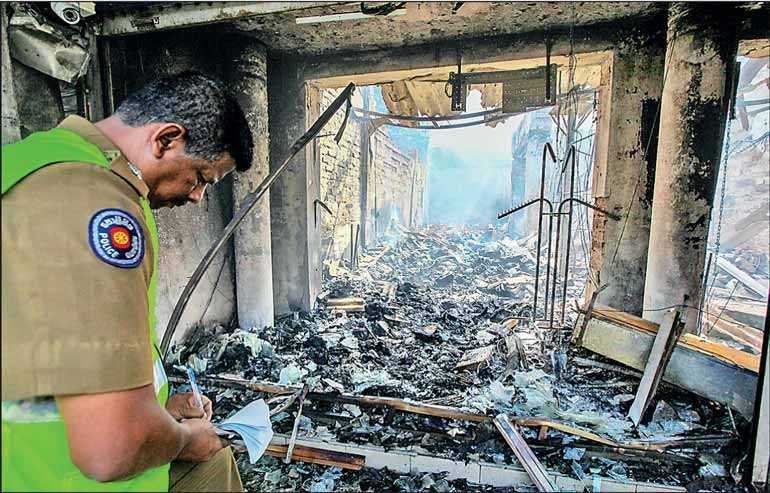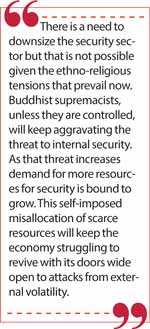Friday Feb 13, 2026
Friday Feb 13, 2026
Wednesday, 4 September 2019 00:00 - - {{hitsCtrl.values.hits}}

The most disappointing and disturbing fact about the presidential race so far is the absence of any statement or discussion about the state of the economy and measures to promote economic growth. Only the JVP candidate has at least referred to the need for a new economic direction and his party’s  readiness to deal with it, if he is elected. Neither Gotabaya Rajapaksa nor his other would be challenger Sajith Premadasa (if nominated), nor anyone else in the campaign has even mentioned the word economy.
readiness to deal with it, if he is elected. Neither Gotabaya Rajapaksa nor his other would be challenger Sajith Premadasa (if nominated), nor anyone else in the campaign has even mentioned the word economy.
This pathetic omission can mean only one thing, and that is, a total abdication of responsibility to manage the economy and readiness to surrender its fate to global market forces and their international managers. All that the parties in power and in opposition can do is to hope against hope that the economy would eventually revive on its own, provided its macro foundations are taken care of by the Central Bank. This unwillingness or reluctance to restructure the economy and make it more people friendly than market friendly is the root of the nation’s economic difficulties.
A fiscal policy to balance the budget by reducing public expenditure, providing incentives to investors, broadening the tax base and cutting entitlements, technically termed as fiscal consolidation; and, a monetary policy to protect the value of capital from inflationary erosion are assumed to be the panacea for economic growth in neo-liberal economies. Concern about improving people’s welfare, quality of life and the environment are conveniently sidelined and assumed to be taken care of by the trickledown effect of economic growth.
In this model, independent central banks are expected to monitor the health of the economy and adjust its monetary policy accordingly to steady the rate of growth. However, the controlling mechanisms that were traditionally made available to these banks have lost much of their potency and central banks have become an ‘institutional anachronism’ under global financial capitalism. Sri Lanka having embraced the neo-liberal model is hopelessly caught in the economic and financial whirlpool of this phenomenon.
The economy is not immune to external volatility and is bound to suffer more with added domestic turbulence. A looming global economic slowdown in the face of continuing trade war between the two largest economies, tension in Hormuz and the Brexit crisis coupled with domestic unrest arising from supremacist politics is bound to hit the economy hard. Is there a way out?
Even if structural changes to the economy are too difficult and messy to undertake in the short term, a new president and a new government can at least tackle some of the non-economic issues that impact the economy adversely. The most fundamental of such issues, which is metamorphosing into a national problem is ethno-religious politics championed by Buddhist supremacists.
Since mid-1950s communalism is at the heart of Sri Lankan politics and has become the chief determinant of the country’s majoritarian democracy. The fact that this political issue has its own economic ramifications and that it affects the health and growth of the economy irrespective of the structure is rarely discussed in public, except by the leftists. Even economists while recommending theoretically sound pro-growth policies overlook the practical difficulty of implementing them because of non-economic constraints. It is therefore encouraging that at least JVP is now talking about the economic consequences of communal politics and the need to tackle it.
Domestic security is emerging as a dominant issue in the forthcoming presidential campaign. Yet, the negative correlation between security and the economy is little talked about. This is not to argue that an economy can grow robustly in an insecure political environment. The negative correlation emerges when looked at security from a different angle. As long as politicians keep on fuelling the ethno-religious flame and create inter-communal and inter-religious tensions the need to strengthen internal security is inescapable and it will demand more and more budgetary allocations. This year alone a total of Rs. 306 billion or more than 13% of budget resources has gone to defence. With declining revenue, more resources to security would obviously mean less to other vital sectors such as health, education, domestic industries and agriculture.
On a global level increased expenditure on security is a 21st century phenomenon, thanks to military Keynesianism and global terrorism. While the former is linked to super power rivalry for world dominance and the growing armament industry, latter is the legacy of Bin Laden, which may be appropriately termed as the Laden-Effect. The military-industrial-complex has become such a holy cow no political party or government dares to question its economic rationale or refuse budgetary support.
However, the Sri Lankan security context has little to do with this global phenomenon but everything to do with its own internal politics. By wantonly exploiting ethno-nationalism and Buddhist supremacy for political advantage, to the extent of even fighting a civil war, governments have created a defence sector that is destined to grow in size and to demand more and more resources unless the need for that growth is removed.
Figures from Global Power Review show that with 281,000 military personnel including 36,000 reserves, and with 76 aircrafts and 210 combat tanks Sri Lanka’s defence budget consumes a whopping $ 1.5 billion and the national debt stands at $ 51.7 billion. How does one expect the economy to revive with this debt burden and military Keynesianism? Enlarging the size of the army and police personal may be one way of reducing unemployment especially amongst the Sinhalese (almost 97% of army personnel are Sinhalese) but it is employment with high social cost.
Sri Lankan army never fought a war against any foreign power and its primary role is therefore to control domestic population from revolting against the rulers. Why should people revolt and what is the need for such control if rulers maintain good governance with justice for all? Had JR taken a bold step to resolve the Tamil issue while opening the economy to market forces, the country would have avoided the civil war, the enormous financial waste and debt it caused and involvement of foreign powers in meddling with nation’s sovereignty.
Unfortunately, an ageing president surrendered the long-term interests of Sri Lanka for short-term gains and prestige. His successors are blindly walking on his footsteps. The country can ill-afford to spend its meagre revenue on security at the expense of growth producing investments.
Once upon a time in the 1950s and 1960s, Sri Lanka was envied by its neighbours for its high quality of public health and educational standards. This has been reversed now. One only has to visit the public hospitals to see the extent of neglect and the universities that are churning out thousands of unemployable graduates every year. Resources that should have gone to maintain high standard in these vital areas and to economically productive sectors have been forced to be redirected into security because of communal politics.
There is a need to downsize the security sector but that is not possible given the ethno-religious tensions that prevail now. Buddhist supremacists, unless they are controlled, will keep aggravating the threat to internal security.
As that threat increases demand for more resources for security is bound to grow.
This self-imposed misallocation of scarce resources will keep the economy struggling to revive with its doors wide open to attacks from external volatility.
Between security and economy the nation faces a hard choice. Solution lies in renouncing ethno-religious politics and disowning the supremacists. JVP appears to have realised this truth, and it should be given a chance to act on it.
(The writer is attached to the School of Business and Governance, Murdoch University, Western Australia.)